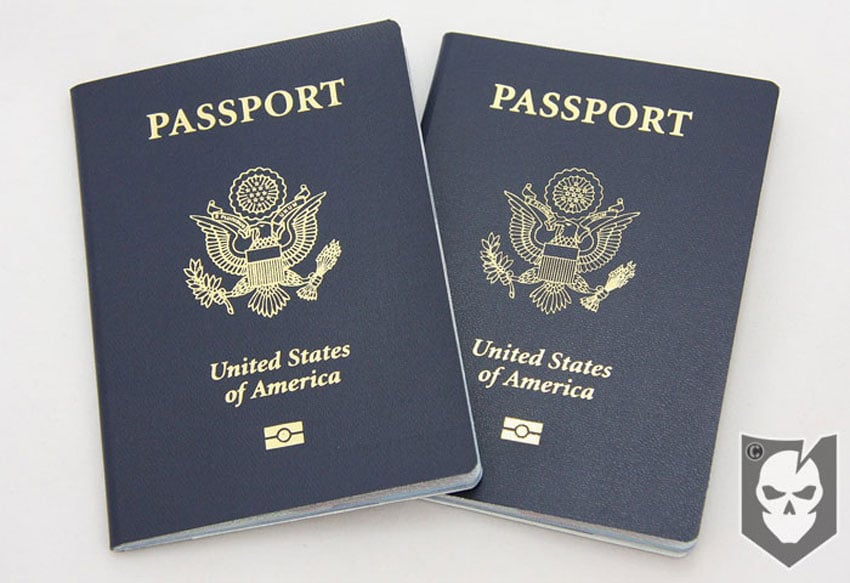
If you’re like me, you have meticulous records, backups of everything, and are always war gaming everything. “What would happen if the house burnt down and I wasn’t able to get anything out?”
I seriously go through these scenarios all the time, especially when it comes to important documents. I’ve recently started investigating the steps to obtaining duplicate passports and passport cards for myself and my family.
There are many reasons why you’d want to have a duplicate passport and even one of the new U.S. Passport Cards.
Why a duplicate?
The primary reason I’m getting duplicates is redundancy. Two is one and one is none, as the saying goes. I live by this. A duplicate allows you to have a passport stored where a friend or family member can access it and send it to you. This is important if your passport is stolen overseas and you need to get home.
I always carry color copies of my passport, but nothing beats having the real thing to receive in an emergency situation.
Here’s some other reasons to consider a duplicate:
- When applying for a visa for international travel to certain countries, you will be required to send off your passport to a consular. During this time, you will be without your passport and unable to leave the United States, unless you have a duplicate passport.
- Having a duplicate passport will allow you overlapping dates of expiration, so that you’ll be able to always have a valid passport, even if a renewal is taking longer than it should. I did this with my Concealed Handgun License. I have my TX CHL with one expiration date, and a Florida permit with a different date.
- Traveling to sensitive countries with certain stamps can cause delays, this is where a second passport comes in very handy.
How to obtain a duplicate
- Fill out Form DS-82 on the U.S. Department of State Website. This is the basic form for applying for a U.S. passport by mail, and is not specific to a duplicate passport. Once the application is filled out, print it out, as you’ll need to mail it or bring in person when applying for a second passport.
- Write a letter explaining your need for a duplicate passport. Just one paragraph is all you need, but it helps if you have travel plans that help your case. Providing a history of trips where a duplicate passport would have been needed will work too.
- Submit Form DS-82, two passport photos, passport fees, and the letter explaining your need for a duplicate. Currently the fees for a duplicate passport are $135, but they’re changing by July 13, 2010, so act quick. It will take 4-6 weeks to find out if your duplicate passport has been approved.
Passport Cards
U.S. Passport Cards have only been around for two years now, but are a great way to have official backup identification in an emergency. If a duplicate passport is more than you’d like to bite off right now, a Passport Card might be the way to go.
The Passport Card can be used to enter the United States from Canada, Mexico, the Caribbean, and Bermuda at land border crossings or sea ports-of-entry and is more convenient and less expensive than a passport book. The passport card CAN NOT be used for international travel by air.
Even though there are limitations with Passport Cards, they’re a great item to have. Other than your travel being logged by the Government, there’s no stamp placed on a Passport Card like there is on the Passport Book. That’s not really as important as it is with sensitive countries and the Passport Book.
The current cost is only $20 if you have a valid Passport Book, but that price is going up to $30 when the new fees go into effect. Here are some great FAQs on Passport Cards, including instructions on how to obtain a Passport Card.
RFID
Just a note that all new Passport Books AND Passport Cards contain RFID (Radio Frequency Identification) chips in them (denoted by the mark in the photo to the right). While the Department of State says there’s no personal information written on the electronic chip itself. The chip does contain a unique number which identifies a stored record within secure government databases.
A protective RFID-blocking sleeve is provided with each passport card to protect against unauthorized reading or tracking of the card when it is not in use. I’d recommend a RFID blocking sleeve for your Passport Book too, or just disable it if you’re paranoid about it (Warning: tampering with your passport could land you 25 years in prison, and land you a strip search each time you travel).
State Department Admits RFID Passports are Insecure
Notes
So I’m curious what you guys do when you travel? Do you make copies of your Passport to take with you and to leave with friends or family?
Can anyone here add more information about duplicate Passports, I’d love to hear your comments and opinions.